’"I am a very incompetent judge of the impression which the last canto of ‘Childe Harold’ may produce on the minds of indifferent readers. It contains the usual trace of a conscience restlessly awake; though his object has been too long to aggravate its burden, as if it could thus be oppressed into eternal stupor. I will hope, as you do, that it survives for his ultimate good. It was the acuteness of his remorse, impenitent in its character, which so long seemed to demand from my compassion to spare every resemblance of reproach, every look of grief, which might have said to his conscience, ‘You have made me wretched.’ I am decidedly of opinion that he is responsible. He has wished to be thought partially deranged, or on the brink of it, to perplex observers, and prevent them from tracing effects to their real causes through all the intricacies of his conduct. I was, as I told you, at one time the dupe of his acted insanity, and clung to the former delusions in regard to the motives that concerned me personally, till the whole system was laid bare. He is the absolute monarch of words, and uses them, as Bonaparte did lives, for conquest, without more regard to their intrinsic value; considering them only as ciphers, which must derive all their import from the situation in which he places them, and the ends to which he adapts them with such consummate skill. Why, then, you will say, does he not employ them to give a better colour to his own character? Because he is too good an actor to over-act, or to assume a moral garb which it would be easy to strip off. In regard to his poetry, egotism is the vital principle of his imagination, which it is difficult for him to kindle on any subject with which his own character and interests are not identified: but by the introduction of fictitious incidents, by change of scene or time, he has enveloped his poetical disclosures in a system impenetrable except to a very few; and his constant desire of creating a sensation makes him not averse to be the object of wonder and curiosity, even though accompanied by some dark and vague suspicions. Nothing has contributed more to the misunderstanding of his real character than the lonely grandeur in which he shrouds it, and his affectation of being above mankind, when he exists almost in their voice. The romance of his sentiments




